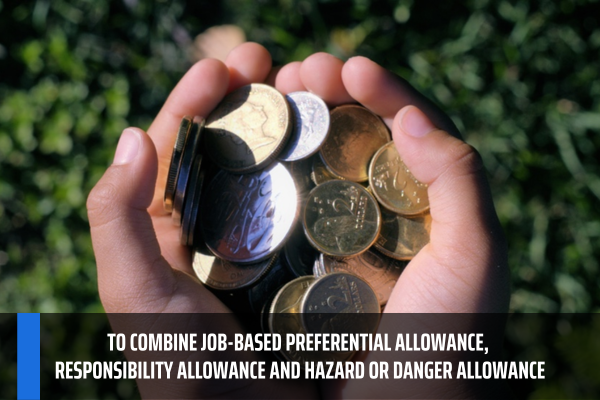To combine job-based preferential allowance, responsibility allowance and hazard or danger allowance in Vietnam from July 1, 2024?
- To combine job-based preferential allowance, responsibility allowance and hazard or danger allowance in Vietnam according to Resolution 27?
- What is the target roadmap for salary reform in Vietnam until 2030 according to Resolution 27/NQ-TW 2018?
- What is the State's guiding position on salary reform in Vietnam?
To combine job-based preferential allowance, responsibility allowance and hazard or danger allowance in Vietnam according to Resolution 27?
At the closing session of the Vietnam Socio-Economic Forum 2023 held in Hanoi on September 19, 2023, National Assembly Chairman Vuong Dinh Hue emphasized the early implementation of salary policy reform in a timely manner in 2024.
“This is a reform, not a normal salary increase. If nothing changes, the time we can apply is from July 1, 2024.
Besides, localities also have excess money for salary reform of VND 208,457 billion. Thus, the budget has a surplus of VND 263,000 billion to implement salary reform from 2024.
One of the notable points of the salary reform from July 1, 2024 is the abolition of seniority allowances for officials. Accordingly, Resolution 27-NQ/TW of 2018 outlines the rearrangement of current allowance regimes, ensuring that the total allowance fund accounts for a maximum of 30% of the total salary budget, implemented as follows:
- Continue to apply part-time allowance; excess seniority allowance; region-based allowances; responsibility allowance; mobility allowance; Allowances for security, national defense and special allowances for the armed forces (army, police, cipher).
- Combine job-based preferential allowance, responsibility allowance and hazard or danger allowance (collectively referred to as occupational allowance) applicable to officials and public employees of occupations and jobs with higher working conditions normal and have appropriate preferential policies of the State (education and training, health care, courts, procuracy, civil judgment enforcement, inspection, examination, auditing, customs, forest rangers, market management,...). Combine special allowances, attraction allowances and long-term work allowances in areas with particularly difficult socio-economic conditions into work allowances in especially difficult areas.
- Annul seniority allowances (except for the military, police, and secret police to ensure salary correlation with officials); leadership position allowances (due to leadership positions in the political system, position salaries are determined); allowances for party work and socio-political organizations; civil service allowances (included in the basic salary); hazard or danger allowance (due to including working conditions with toxic and dangerous elements in occupational allowances).
- New regulations on allowances according to administrative unit classification for commune, district and provincial levels.
- Consistently implement monthly allowance funds for part-time workers at the commune level, in villages and residential groups based on the regular expenditure rate of the Commune People's Committee; At the same time, regulate the maximum number of part-time workers for each type of commune, village, and residential group.
On that basis, the People's Committee at the commune level submits to the People's Council at the same level to specifically stipulate the titles eligible for allowances in the direction that one title can undertake many jobs but must ensure the quality and efficiency of assigned job.

To combine job-based preferential allowance, responsibility allowance and hazard or danger allowance in Vietnam from July 1, 2024?
What is the target roadmap for salary reform in Vietnam until 2030 according to Resolution 27/NQ-TW 2018?
The target roadmap for salary reform until 2030 is determined according to clause 2.2, subsection 2, Section II of Resolution 27-NQ/TW of 2018.
As follows:
Detail goal
(1) From 2018 to 2020
For the public sector
- Continue to adjust the base salary according to the Resolution of the National Assembly, ensuring it is not lower than the consumer price index and consistent with the economic growth rate; Do not add new types of allowances according to occupation.
- Complete the development and promulgation of a new salary regime according to the content of salary policy reform, associated with the roadmap for administrative reform and staff streamlining; innovate and reorganize the apparatus of the political system; renewing public service units according to the Central Resolution.
For the corporate sector
- Implement adjustments to increase the region-based minimum wage in accordance with the socio-economic development situation and the ability to pay of businesses so that by 2020 the minimum wage ensures the minimum living standard of workers and families. family.
- Pilot implementation of labor and salary management for state-owned enterprises according to the contents of the approved salary policy reform project.
(2) From 2021 to 2025 and vision to 2030
For the public sector
- From 2021, apply a new unified salary regime for officials, public employees, and armed forces in the entire political system.
- In 2021, the lowest salary of officials and public employees is equal to the lowest average salary of regions in the corporate sector.
- Periodically raise wages in accordance with the consumer price index, economic growth and state budget capacity..
- By 2025, the lowest salary of officials and public employees will be higher than the average lowest salary of regions in the corporate sector.
- By 2030, the lowest salary of officials and public employees will be equal to or higher than the lowest salary of the highest region of the corporate sector.
For the corporate sector
- From 2021, the State periodically adjusts the region-based minimum wage based on recommendations of the National Wage Council. Enterprises are allowed to implement salary policies on the basis of negotiations and agreements between employers and employees and collective representatives of employees; The state does not directly intervene in enterprises' salary policies.
- Implement labor and salary management in state-owned enterprises according to the method of contracting salary costs associated with the production and business tasks of the enterprise until 2025 and moving towards contracting the production and business tasks of the enterprise. industry by 2030.
What is the State's guiding position on salary reform in Vietnam?
Pursuant to Section II of Resolution 27-NQ/TW of 2018 as follows:
DIRECTING VIEWPOINTS, OBJECTIVES AND CONTENT OF REFORM
1. Guiding viewpoint
1.1. Salary policy is a particularly important policy of the socio-economic policy system. Salaries must truly be the main source of income to ensure the lives of workers and their families; Pay wages correctly is an investment in human resource development, creating motivation to improve labor productivity and work efficiency of workers, making an important contribution to achieving social progress and justice, and ensuring stability. socio-political; promote and improve the quality of growth and sustainable development.
1.2. Salary policy reform must ensure comprehensiveness, systematicity, synchronization, inheritance and promotion of advantages, and effectively overcome limitations and inadequacies of the current salary policy; comply with the principle of distribution according to labor and the objective laws of the market economy, taking increased labor productivity as the basis for increasing wages; meet international integration requirements; have a roadmap suitable to the socio-economic development conditions and resources of the country.
1.3. In the public sector, the State pays salaries to officials, public employees and the armed forces according to their employment positions, titles and leadership positions, in accordance with the State's resources and public service revenues to ensure reasonable correlation with wages in the labor market; Implement a worthy remuneration and reward regime based on labor productivity, creating motivation to improve quality, work efficiency, public service ethics, professional ethics, contributing to cleanliness and improving effectiveness, the performance of the political system.
1.4. In the corporate sector, wages are the price of labor, formed on the basis of agreements between employees and employers according to a market mechanism under the management of the State. The state regulates the minimum wage as the lowest floor to protect vulnerable workers, and is also one of the bases for negotiating wages and regulating the labor market. Salary distribution is based on labor results and production and business efficiency, ensuring harmonious, stable and progressive labor relationships in the enterprise.
1.5. Salary policy reform is an objective requirement, an important task, requiring high political determination in building a socialist rule-of-law state and perfecting socialist-oriented market economic institutions. means; promote administrative reform; innovate and streamline the political system's organizational apparatus, operate effectively and efficiently, and streamline staffing; innovate the organization and management system, improve the quality and operational efficiency of public service units.
Thus, in salary reform, the State has expressed its guiding viewpoint according to the above content.
Accordingly, the reform of salary policy must ensure comprehensiveness, systematicity, synchronization, inheritance and promotion of advantages, and effectively overcome limitations and inadequacies of the current salary policy.
LawNet
